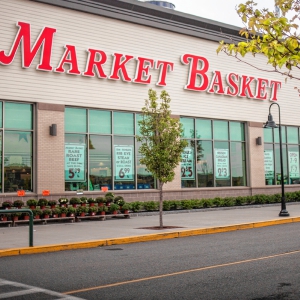Massive liquor distribution center in Bow is getting even bigger
| Published: 12-04-2022 8:30 PM |
Located just off Route 3A, the DHL Bow Distribution Center, a massive 244,000-square-foot warehouse – more than four football fields of space – holds all the alcohol sold in the state’s 67 liquor stores.
Sales have been so steady, the distribution center needs even more room for storage.
The building’s exterior stands in stark contrast to what lies within. Inside, aisles of pallets towering at 40 feet high are stacked with cases of spirits and wine from around the world.
New Hampshire Liquor Commission signed a 20-year contract with DHL, the world’s largest logistics provider in 2013 to warehouse and transport alcoholic beverages to stores and restaurants. With its location in Bow, the warehouse is conveniently located close to interstates, making transportation easy.
Not only is New Hampshire one of 17 control states in the country, but it is also one of six states that allow out-of-state companies to ship spirits directly to consumers.
“We are pretty progressive in that mindset,” said liquor commission chairman, Joseph Mollica. “So we’re basically running an alcohol wholesale and retail business within the confines of a state.”
At the back of the warehouse, in the high-volume aisle, cases of holiday beverages like Fireball Candy Cane and Korbel are loaded on pallets ready to be shipped.
The holiday season is always busy, said Patrick Kerns, DHL Supply Chain’s general manager, and the volume of spirits in the warehouse is massive.
Article continues after...
Yesterday's Most Read Articles
 ‘Would you raise your right hand?’ — Local veterans consider the meaning of Memorial Day
‘Would you raise your right hand?’ — Local veterans consider the meaning of Memorial Day
 Jesse Sullivan pleads guilty to second-degree murder of half-brother, Zackary
Jesse Sullivan pleads guilty to second-degree murder of half-brother, Zackary
 ‘Bittersweet’: The Post on Main Street closes Friday
‘Bittersweet’: The Post on Main Street closes Friday
 Messy parking around Concord’s bus terminal won’t get less messy any time soon
Messy parking around Concord’s bus terminal won’t get less messy any time soon
 New Hampshire school phone ban could be among strictest in the country
New Hampshire school phone ban could be among strictest in the country
 ‘Something to chase’: Pascal Zabayo’s art fundraiser grows soccer from Concord to Kampala, Uganda
‘Something to chase’: Pascal Zabayo’s art fundraiser grows soccer from Concord to Kampala, Uganda
“We have 1,230,000 cases,” said Kerns. “That’s the most we’ve had in this building since we’ve been open.”
Last year, the company installed a new racking system to accommodate the increasing volume of liquor brought to the facility. The pallets on the new racks are supported by skates that can be pushed deeper to accommodate several more.
Increasing the warehouse’s capacity doesn’t stop there. To accommodate the increasing sales of the liquor commission, DHL broke ground earlier this month to expand its capacity with a 27,235-square-foot addition.
Kerns said the expansion will provide the distribution center with approximately 200,000 additional cases of space, and possibly even more with a new racking system designed with narrower aisles.
Although the liquor commission’s contract with such a warehouse may have Granite Staters concerned about the expense the state must pay to house the immense bank of alcoholic beverages, Mollica assures such is not the case.
“Most people don’t know that the state doesn’t own the products that are in the warehouse,” Mollica said. “It’s owned by the brokers and suppliers.”
Suppliers rent space from DHL to store their products and pay a fee based on the number of days their products sit in the warehouse.
The liquor commission’s profits are reinvested in the general fund to pay for essential services and to fund a variety of state projects, including the alcohol education fund.
Navigating hundreds of square feet of space while remembering where an item is stored is nearly impossible. DHL overcomes the challenge by utilizing voice pick technology to assure order fulfillment efficiency. When orders arrive, the system schedules them and sends them to the floor workers via a headset. The automated voice instructs the employees on the exact location and number of cases to pick. The system instantly changes the inventory after the order is picked and the employee says into the microphone that he has picked up the order. The cases are then transported to the audit station to ensure that everything is in order.
“Human beings are going to make mistakes,” said Kerns. “But our inventory accuracy is 98% to 99% and that’s very high, as is our order accuracy.”
The state also allows restaurants to purchase expensive liquor by the bottle, which benefits small businesses with limited resources.
Mollica has owned restaurants and understands the tight margins business owners work with.
“I can replenish it at any time I want to and it’s not actually sitting in my inventory,” said Mollica. “It’s sitting here. So the cost to the licensee drops, but the convenience is still there.”
The building prioritizes green initiatives in addition to improving efficiency. They bale and recycle the cardboard from the cases, as well as the stretch wrap used for shipping. The plastic from the state’s liquor stores is also recycled at the building.
Kerns said that they are in an excellent position from a staffing standpoint to tackle the holiday season, and he will leave after nine years in this post to pursue a new role, with Gregory Featherston taking over as general manager.
“It is truly a public-private partnership,” said Mollica. “There are people other than the state and DHL profiting from the products that are in this building.”
]]>







 Senate lawmakers vote to lift betting limits to attract high-rollers to New Hampshire’s casinos
Senate lawmakers vote to lift betting limits to attract high-rollers to New Hampshire’s casinos In echo of 2014 struggle, Market Basket board sidelines ‘Artie T.’ from CEO spot
In echo of 2014 struggle, Market Basket board sidelines ‘Artie T.’ from CEO spot Historic former Boscawen library building on sale – again
Historic former Boscawen library building on sale – again
